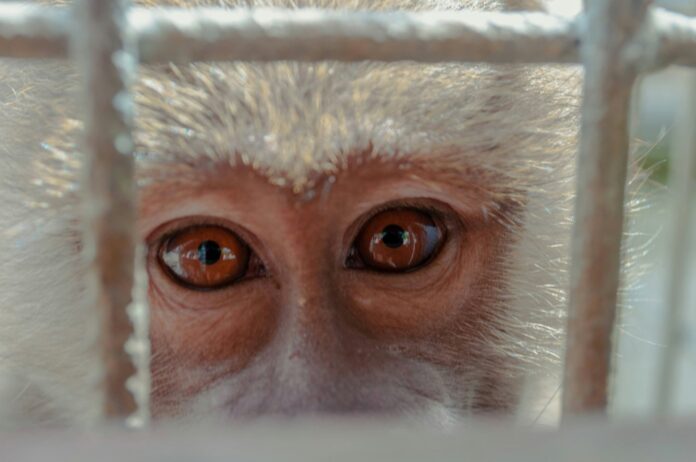Authorities warn residents to stay indoors and keep pets safe as the search for the escaped macaque, Bradley, continues
The search for Bradley, a pet primate that escaped from its habitat in South Carolina, continues. Colleton County Animal Services reported the ongoing search on Sunday, urging residents to stay indoors and secure their pets.
The Colleton County Sheriff’s Office alerted the public through a Facebook post on Friday. They informed residents of the Walterboro area, located 48 miles west of Charleston, about Bradley’s escape. Bradley, a 15-year-old macaque, has lived in Walterboro for six years.
Despite efforts from Bradley’s owner and local authorities, the elusive primate remained unfound as of Sunday morning. “Animal Control and the Sheriff’s Office have received numerous tips as to Bradley’s location,” said Laura Clark, Director of Colleton County Animal Services. However, she noted that increased attention on social media and news channels has complicated the search, with onlookers hindering capture attempts.
Authorities hired professionals to assist in reuniting Bradley with his owner. Walterboro resident Tiffany Edenfield captured an image of the primate standing in the grass, showing its red face, similar to some baboon and macaque species. Another resident, Kordell Brabham, initially dismissed his grandmother’s claim of spotting a monkey. However, he later confirmed the sighting and recorded a video of Bradley walking on top of a shed.
Residents have been advised not to approach the primate, which the sheriff’s office warns could be stressed. The office also urged the public to report sightings and monitor their pets as a precaution. The sheriff’s office received a report of Bradley attempting to attack a dog in a resident’s yard.
The circumstances surrounding Bradley’s escape and his residence in Walterboro remain unclear. South Carolina law prohibits the purchase or possession of great apes, such as chimpanzees, gorillas, and orangutans. However, the state allows the ownership of other wild animals, including smaller primates like monkeys and baboons.
The incident highlights ongoing concerns about the legality and safety of keeping exotic pets. The South Carolina Department of Health and Environmental Control confirms that current laws do not restrict the ownership of smaller primates. This loophole raises questions about the adequacy of regulations concerning wild animals kept as pets.
The escape of Bradley has brought attention to the responsibilities and risks associated with owning exotic animals. While Bradley’s owner and authorities work diligently to capture him, the incident underscores the need for more stringent regulations and better public awareness regarding exotic pet ownership.
Analysis :
The escape of Bradley, the pet primate, brings to light several significant issues. Politically, this incident could prompt South Carolina lawmakers to reconsider the existing regulations on exotic pet ownership. The current law, which allows the possession of smaller primates, may face scrutiny as residents and officials recognize the potential dangers and complications of keeping such animals.
Economically, the costs associated with capturing and safely returning Bradley are considerable. Hiring professionals and dedicating resources to the search place financial strains on local authorities. Additionally, if stricter regulations are implemented, there could be economic implications for businesses involved in the exotic pet trade.
Sociologically, the escape of Bradley affects the daily lives of Walterboro residents. The fear and uncertainty caused by a loose primate stress the community, highlighting the potential risks exotic pets pose to public safety. This situation may lead to increased advocacy for stricter laws and more responsible pet ownership practices.
From a local perspective, the incident has united the community in concern and vigilance. Residents actively participate in reporting sightings and ensuring the safety of their pets. The collective effort underscores the importance of community cooperation in addressing such emergencies.
Gender and race considerations in this context may involve analyzing the demographic distribution of exotic pet ownership. Understanding who owns these animals and their reasons can provide insights into the social and cultural factors influencing this trend. Additionally, the impact on marginalized communities, who may lack resources to deal with such emergencies, should be considered.
The theoretical perspectives on exotic pet ownership emphasize the intersection of legal, ethical, and environmental factors. The loophole in South Carolina’s law allowing the ownership of smaller primates poses significant ethical questions about animal welfare and public safety. This incident highlights the need for a comprehensive review of existing regulations to ensure they address the complexities of exotic pet ownership adequately.
In conclusion, the escape of Bradley, the pet primate, serves as a wake-up call for South Carolina regarding the ownership of exotic animals. The incident underscores the need for stricter regulations, better public awareness, and responsible pet ownership practices. Addressing these issues requires a multifaceted approach involving lawmakers, animal welfare organizations, and the community.
